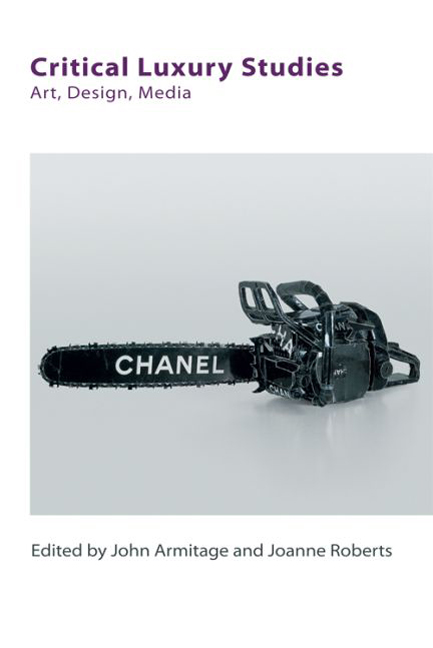Book contents
- Frontmatter
- Contents
- List of Figures
- List of Tables
- Series Editors’ Preface
- Acknowledgements
- Notes on Contributors
- 1 Critical Luxury Studies: Defining a Field
- I CRITICAL LUXURY STUDIES
- 2 Knowing Luxury: From Socio-Cultural Value to Market Price?
- 3 Luxury: A Dialectic of Desire?
- 4 The Luxury Duality: From Economic Fact to Cultural Capital
- 5 ‘Life's Little Luxuries?’ The Social and Spatial Construction of Luxury
- 6 The Object and Art of Luxury Consumption
- II ART, DESIGN, MEDIA
- Index
3 - Luxury: A Dialectic of Desire?
from I - CRITICAL LUXURY STUDIES
Published online by Cambridge University Press: 23 September 2017
- Frontmatter
- Contents
- List of Figures
- List of Tables
- Series Editors’ Preface
- Acknowledgements
- Notes on Contributors
- 1 Critical Luxury Studies: Defining a Field
- I CRITICAL LUXURY STUDIES
- 2 Knowing Luxury: From Socio-Cultural Value to Market Price?
- 3 Luxury: A Dialectic of Desire?
- 4 The Luxury Duality: From Economic Fact to Cultural Capital
- 5 ‘Life's Little Luxuries?’ The Social and Spatial Construction of Luxury
- 6 The Object and Art of Luxury Consumption
- II ART, DESIGN, MEDIA
- Index
Summary
I start at the beginning with a word about my title. I allude to the philosophy of Hegel. For Hegel, thought or reason has a dynamic tripartite structure: there is a posited affirmation, a negation or contradiction of that affirmation, then a negation of that negation or a reaffirmation. This reaffirmation, however, is not a return to the status quo ante but rather constitutes a preservative transcendence that is captured in Hegel's exploitation of the German term Aufhebung. I am not about to embark upon an investigation of Hegelian metaphysics but I do want to use this tripartite structure to frame this discussion. My title also ends with a question mark. It serves to signal the open-ended character of my argument, in particular whether there is a viable Aufhebung, a move beyond the second phase or Moment (in Hegel-ese).
More concretely, the three parts are as follows: Part I outlines the view that luxury as part of a moralised vocabulary was considered bad or dangerous; this view persists until about the seventeenth century. In Part II, I outline the rejection or negation of this, the process that I have labelled the ‘de-moralisation’ of luxury. In these first two parts I necessarily have to paint with a broad brush as I depict two and a half thousand years of speculation about luxury. In Part III, I examine what might be said about a ‘re-moralisation’, that is, whether there is a viable or sustainable critique of luxury in the contemporary world. My triad is thus moralisation, de-moralisation, re-moralisation (question mark). A leitmotif through this is the role played by, and assessment of, human desire.
Moralisation
Classically luxury belongs generically in a moralised vocabulary. It takes its meaning from its role as a corruption of virtue. Hence poverty, frugality, simplicity and austerity are estimable practices that exhibit the virtues of temperance and continence. To be austere is to be in control of oneself and thus of one's actions. I have in mind here the Stoic sage who will drink but not get drunk or the Patristic prohibition of sex with, or by, a pregnant woman.
- Type
- Chapter
- Information
- Critical Luxury StudiesArt, Design, Media, pp. 47 - 66Publisher: Edinburgh University PressPrint publication year: 2016



